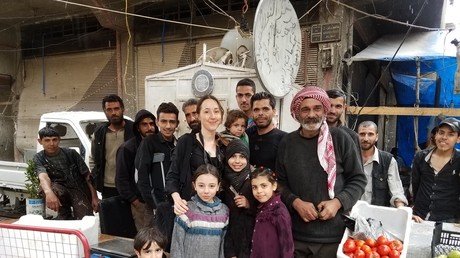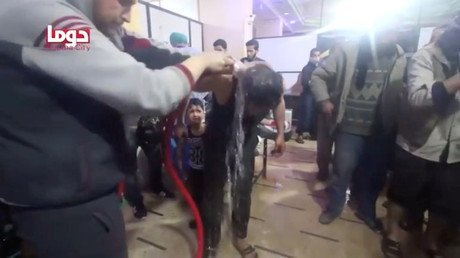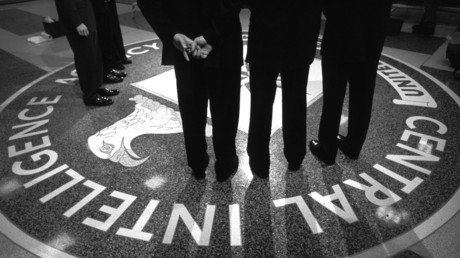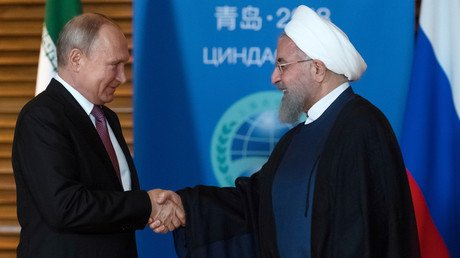Empowering the OPCW to ‘assign blame’ in Syria only serves western regime-change agenda
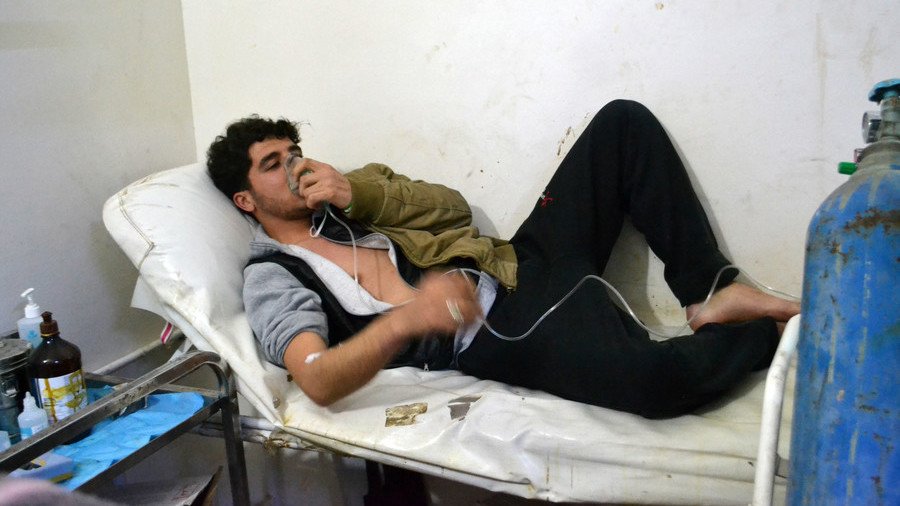
In a move spearheaded by UK, the UN chemical weapons watchdog has been tasked with identifying the perpetrators of future chemical attacks, a disastrous decision that is almost certain to incite more chaos in Syria.
Up until now, it has been the primary task of the Organization for the Prohibition of Chemical Weapons (OPCW) to determine if chemical weapons, and of what type, have been used during such suspected outrages. Its mandate did not include working as Sherlock Holmes, pointing the finger of blame at some state player or agency.
Now that is about to change.
As the Times of London gleefully reported “Britain won a victory over Russia” after a western bloc voted to “give the OPCW enhanced powers to identify those behind the attacks in Syria.” According to the article, this will hamper Russian efforts to “protect the Syrian government from censure for using chemical weapons.” This is a blatantly irresponsible piece of journalism that fails on two counts.
First, it fails to recognize other possible culprits for orchestrating chemical attacks aside from the least likely one, that is, the Syrian government. Second, Russia has never attempted to “protect” anyone over claims of using chemical weapons. Rather, it has continuously called for legitimacy and transparency when investigating such incidences.
With alarming frequency, it is possible to discern the ulterior motives of Atlantist policymakers without having to ‘read between the lines’ of the Western mainstream media. It’s always right there in your face. After all, how can we honestly speak about the use of chemical weapons in Syria without ever mentioning that the Syrian rebels could be guilty of resorting to such dirty tactics? This is a consideration the OPCW will hopefully address in the course of their investigative endeavors, but those hopes do not look particularly good at the moment.
Much of Russia’s concern over the newly empowered OPCW is based on the past behavior of the UN chemical watchdog. In fact, last year Russia denounced a report by the OPCW on the April 4 chemical incident in the Syrian town of Khan Sheikhoun because its reasonable proposal that OPCW investigators visit the sites of the suspected chemical attack “was blocked by Western delegations without any explanations.”
“London, Paris, and the OPCW have given no answers to our questions as to where they took these samples, who took them, or when they were delivered,” Foreign Minister Sergey Lavrov stated.
“I think we are very close to this organization [OPCW] being discredited,” he added.
This is a worrisome sign that the OPCW will obediently toe the well-known Western line on Syria. If this organization gets dragged into the gravitational political pull of the US, Britain and France, then who can it be expected to “name and shame” following the next outrage? If you guessed the ‘terrorist-backed Syrian rebels’ you clearly have not been following the Syrian crisis. Indeed, without the courtesy of a formal investigation, the Western powers never hesitate to blame the ‘Assad regime’ every time a chemical attack is purported to have occurred. The rash, groundless accusations are then followed up promptly by some sort of military strike on Syrian government forces.
That simple Pavlovian lesson has not been lost on the rebels. In light of such selective justice, only an idiot or a charlatan would doubt that the rebels have the greatest incentive of all to make certain these deadly attacks happen. In other words, due to its refusal to suspect other culprits for the attacks, it is the West – not Syria and Russia – that is fomenting the violence in the Arabic republic.
The situation facing Syria resembles that of any defendant who stands at risk of not getting a fair trial due to the geographical location of the court, as well as the impartiality of the jury. Considering that the watchdog is based in The Hague, its members may be more susceptible to the exertion of political pressure from London, Brussels, Washington and Paris with regards to identifying any future perpetrators. Indeed, judging by the shocking degree of impartiality in the above Times article, the guilty party has already been established, otherwise why else would London reportedly be celebrating a “victory over Russia”? A "victory" over what exactly? The judicial system?
Russia’s concern over the decision to award the OPCW with what essentially amounts to police powers is not limited to Syria. Consider the recent circus of the Skripal affair, for example, which involved the poisoning of Sergey Skripal, a former double agent who Russia handed over to Britain as part of a spy swap in 2010, and his daughter Yulia.
On March 4, the pair was found unconscious on a park bench in Salisbury, England. According to British investigators the two were poisoned by a ‘Novichok’ nerve agent. Just days later, and without any formal investigation, British PM Theresa May said it was “highly likely” Russia was responsible for the alleged attempted assassination. It seems that considering the severity of the charges, May should have waited a bit longer for conclusive evidence before leveling blame against Russia.
'The dancing bear of British hypocrisy over Russia' (Op-Ed by @JohnWight1) https://t.co/XGCICjiRm0
— RT (@RT_com) May 8, 2018
Russian Foreign Minister Sergey Lavrov, citing the results of the examination conducted by state-owned Spiez Laboratory (the facility is controlled by the Swiss Federal Office for Civil Protection and by extension the country’s defense minister) that carried out an analysis of samples that London handed over to the OPCW, said that the substance used on the Skripals was an agent called BZ. This toxin was never produced in Russia, but was in service in the US, UK, and other NATO states.
Moscow has never been provided with a satisfactory explanation as to why the full details of the state laboratory were not included in the OPCW final report.
Seymour Hersh, Pulitzer Prize-winning reporter, questioned the UK government’s stance on the Skripals’ poisoning, noting there is an “instinctive dislike” of Russia within the UK.
“There’s bias all the time, this country’s riddled with bias, there’s a great dislike of Russia here, an instinctive dislike,” he said in an interview with BBC Radio 4’s The Media Show.
Unfortunately, it is in this sort of toxic, anti-Russia atmosphere that the OPCW will be forced to conduct its ‘unbiased and independent’ investigative work. This bodes ominously for any investigation into some future chemical attack in Syria. Against all odds, the chemical weapon watchdog must remain a neutral observer and not assign blame according to past tendencies, which would only give the West the excuse it desperately needs to initiate another regime change, this time in Syria.
Think your friends would be interested? Share this story!
The statements, views and opinions expressed in this column are solely those of the author and do not necessarily represent those of RT.

